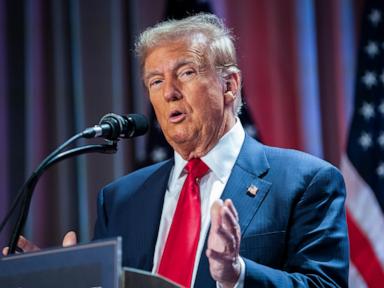Trump can deter Chinese aggression against Taiwan — if he has the will

Last week, the Brookings Institution held a security conference with Adm. Samuel J. Paparo, commander of United States Indo-Pacific Command — the U.S. military arm charged with confronting the hostile rise of the People’s Republic of China.
Here he addressed the growing danger of conflict with China, warning, “Over the summer I saw the [largest] rehearsal and the most joint exercises from the People's Republic of China that I had ever seen … over an entire career of being an observer.”
Paparo recounted that 2027 is now the date by which Xi Jinping has said the People’s Liberation Army must be ready to seize Taiwan, eight years earlier than China’s original target date of 2035. He said Beijing has made it “a war of necessity” rather than a “war of choice” because of the working of China’s 2005 Anti-Secession Law, which declared that if Taiwan took too long to accept “peaceful” unification, China would be entitled to unify it by “non-peaceful means.” That enactment was China’s answer to America’s Taiwan Relations Act, which made Taiwan’s democratic security an official interest of the United States.
The U.S. policy of strategic ambiguity on whether it would defend Taiwan must finally be replaced by strategic clarity — that an attack on any U.S. asset or ally, even if less than “massive,” will be treated as the act of war it is and will bring down the full non-nuclear force of the U.S. military on China. There can be no question of incremental, tit-for-tat, “non-escalatory” targeting that would drain U.S. resources and will (and allow Beijing to re-arm and re-group). China must be made to understand the self-destructive stupidity and futility of starting a war with the United States.
It will soon fall on President-elect Trump to send that message to Beijing, and far more effectively than President Biden has. On four different occasions, he told journalists that the U.S. would use military force to defend Taiwan, only to have White House and State Department officials walk back the remarks. Presumably, Marco Rubio as secretary of State and Mike Waltz as national security adviser will ensure that a strong Trump message of resolve will be reinforced, not undermined, by the foreign policy establishment within the federal government, aided and abetted by business leaders more committed to corporate profits than America’s national security.
When Trump was asked by reporters in 2016 the same question that Biden got — “What would you do if China attacked Taiwan?” — he refused to disclose his intentions but ominously growled, “China knows what I’m gonna do.” Out of office, however, Trump has struck a less Taiwan-friendly note, blaming it for “taking away” the U.S. computer chip industry and not paying the U.S. for security assistance. He has also said his response to a Chinese attack on Taiwan would merely be to impose crippling tariffs, equivalent to Biden’s ineffective warning of purely economic sanctions to forestall Vladimir Putin’s invasion of Ukraine.
Xi is likely to be as undeterred by a nonmilitary response as his “no-limits strategic partner” was in February 2022, since both dictators claim to be playing for existential stakes, “reunifying” their homelands. Ultimately, tariffs and sanctions can be managed and evaded, but a decisive military response to a hostile military action can impose unacceptable costs and risks for Xi or any subsequent Chinese leader. If Xi is as wise as Trump and many others believe, he won’t risk all, including his rule, on a foolish Taiwan venture.
Trump can show his successor-cum-predecessor how deterrence of aggression actually works and thereby save the world from a catastrophic Chinese miscalculation. Immediately after resuming the presidency in January, he can set the right tone for the U.S.-China relationship by sending a carrier task force through the international waters of the Taiwan Strait for the first time in 18 years.
Joseph Bosco served as China country director for the secretary of Defense from 2005 to 2006 and as Asia-Pacific director of humanitarian assistance and disaster relief from 2009 to 2010. He is a nonresident fellow at the Institute for Corean-American Studies, a member of the advisory board of the Global Taiwan Institute and member of the advisory board of The Vandenberg Coalition.
Topics
-

GOP senators warn Trump against aggressive recess appointment move
Politics - The Hill - 5 days ago -
Chinese warplanes track US Navy aircraft through the sensitive Taiwan Strait
World - ABC News - Yesterday -
‘DJT’ stock has seen ‘aggressive’ selling by retail investors leading into election
Business - MarketWatch - October 31 -

Taiwan president congratulates Trump on victory
Politics - The Hill - November 6 -
Manhattan DA says he's against dismissing Trump's "hush money" conviction
Top stories - CBS News - November 19 -

How California has been ‘Trump-proofing’ itself against federal reprisal
World - The Guardian - November 7 -

Chess: Garry Kasparov still has it at 61 as he holds his own against the US elite
World - The Guardian - November 1 -

Can Trump Prevent a TikTok Ban? His Team Says ‘He Will Deliver’
Business - The New York Times - November 12 -

Can he do that? How Trump could try to break the federal government
Top stories - ABC News - 6 days ago
More from The Hill
-
Morning Report — Trump’s tariff plans rock global, local leaders
Politics - The Hill - 20 minutes ago -

End of Trump prosecutions renews scrutiny of DOJ's pace
Politics - The Hill - 40 minutes ago -

Ranked-choice advocates forced to regroup after election losses
Politics - The Hill - 40 minutes ago -

School choice movement embraces new possibilities with Trump presidency
Politics - The Hill - 40 minutes ago -

4 takeaways from Trump's health agency nominations
Politics - The Hill - 40 minutes ago